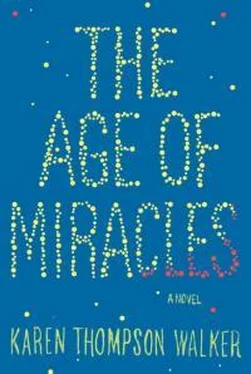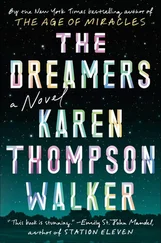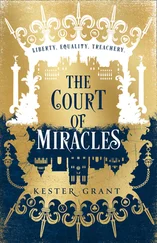They would also learn from the disc that at the time of the Explorer ’s launching, the darknesses were deepening and our food supply was more and more at risk. Though the pace of the slowing had slackened over the years, it had never stopped. The damage had been done, and we had come to suspect that we were dying. But perhaps the disc will also convey that we carried on. We persisted even as most of the experts gave us only a few more years to live. We told stories and we fell in love. We fought and we forgave. Some still hoped the world might right itself. Babies continued to be born.
My mother continued to teach part-time at the high school until it closed a few years back, after too many kids stopped coming. Her sickness didn’t progress the way Seth’s did. My father works at the hospital to this day.
They live in the same house where I grew up, but it looks very different from the way I remember it. The grass and the bougainvillea are long gone, of course, and thick steel sheeting now coats the exterior walls to keep out the radiation. Sunproof shutters block the view I used to see from my old bedroom window. Across the street, Sylvia’s house has been torn down. An empty lot sits where her porch once stood.
My mother says I spend too much time thinking about the past. We should look ahead, she says, to the time that’s left. But the past is long, and the future is short. As I write this account, one ordinary life, our days have stretched to the lengths of weeks, and it’s hard to say which times are most hazardous now: the weeks of freezing darkness or the light.
It’s only a matter of time before the fuel that keeps us alive runs out.
I do try to move forward as much as possible. I’ve decided to try to become a doctor, though some of the universities have closed. No one knows what the world will be like by the time I finish school.
It’s hard, I find, not to think of better times. Late on certain bright nights, during the long weeks of light, I lie awake, unable to sleep. My mind drifts, and I remember Seth. I sometimes find myself believing that he might come back to me someday. I’ve become a collector of stories about unlikely returns: the sudden reappearance of the long-lost son, the father found, the lovers reunited after forty years. Once in a while, a letter does fall behind a post office desk and lie there for years before it’s finally discovered and delivered to the rightful address. The seemingly brain-dead sometimes wake up and start talking. I’m always on the lookout for proof that what is done can sometimes be undone.
Seth and I used to like to picture how our world would look to visitors someday, maybe a thousand years in the future, after all the humans are gone and all the asphalt has crumbled and peeled away. We wondered what those visitors would find here. We liked to guess at what would last. Here the indentations suggesting a vast network of roads. Here the deposits of iron where giant steel structures once stood, shoulder to shoulder in rows, a city. Here the remnants of clothing and dishware, here the burial grounds, here the mounds of earth that were once people’s homes.
But among the artifacts that will never be found—among the objects that will disintegrate long before anyone from elsewhere arrives—is a certain patch of sidewalk on a California street where once, on a dark afternoon in summer at the waning end of the year of the slowing, two kids knelt down together on the cold ground. We dipped our fingers in the wet cement, and we wrote the truest, simplest things we knew—our names, the date, and these words: We were here .
For my parents
and
for Casey
Thank you to my teachers, all of whom were essential: Aimee Bender, Nathan Englander, Mary Gordon, Sam Lipsyte, Dani Shapiro, Mona Simpson, and Mark Slouka.
I am deeply indebted to Alena Graedon, Nellie Hermann, Nathan Ihara, and Maggie Pouncey, whose friendship, insights, and willingness to read my sentences so often over the course of a decade or so has shaped me as much as my work.
Thank you to Colin Harrison, for sage advice on life and literature.
Thank you to Rivka Galchen, Tania James, Susanna Kohn, and Karen Russell, for crucial readings and suggestions.
Thank you to Eric Simonoff, for your belief, patience, and vision. Thank you to Laura Bonner and Cathryn Summerhayes, for so brilliantly representing me to the rest of the world. Also at WME, thank you to Tracy Fisher, Alicia Gordon, Britton Schey, and Kate Hutchison.
Thank you to my wonderful editor, Kate Medina at Random House, whose insights and attention to these pages moved and amazed me at every stage. Thank you to the whole Random House team, especially Gina Centrello, Susan Kamil, London King, Lindsey Schwoeri, and Anna Pitoniak.
Thank you to Suzanne Baboneau, Ian Chapman, Jessica Leeke, and the rest of the team at Simon & Schuster UK for your boundless enthusiasm.
For crucial assistance of various kinds at various times, thank you to Jonathan Karp, Alice Mayhew, Carolyn Reidy, Dan Scolnic, Michael Maren, Hannah Tinti, Antonio Sersale, and Carla Sersale. For consistently and entertainingly refining my ideas about books, thank you to Brittany Banta, Jenny Blackman, Meena Hartenstein, Paul Lucas, Finn Smith, Pitchaya Sudbanthad, and Devin McKnight.
For friendship and moral support over many years, thank you to Kate Ankofski, Shiloh Beckerley, Kelly Haas, Heather Sauceda Hannon, Sara Irwin, Samantha Martin, Carrie Loewenthal Massey, and Heather Jue Northover.
For love and enthusiasm, thank you to Liz Chu, Kiel Walker, Cheryl Walker, Steve Walker, and Chris Thompson.
Thank you most of all to my parents, Jim and Martha Thompson, for making everything possible. In particular, thank you for encouraging my interest in writing—even when it went against your better judgment.
And finally, thank you to Casey Walker, my first reader, whose intelligence, generosity, and love have improved not only these pages but also my days—in ways too profound to name. Thank you, Casey.
KAREN THOMPSON WALKER is a graduate of UCLA and the Columbia MFA program and is the recipient of the 2011 Sirenland Fellowship as well as a Bomb magazine fiction prize. A former editor at Simon & Schuster, she wrote The Age of Miracles in the mornings before work. Born and raised in San Diego, she now lives in Brooklyn with her husband. The Age of Miracles is her first book.
Q&A with Karen Thompson Walker
Q. In The Age of Miracles , you envision a natural phenomenon that threatens the entire world. This “slowing” is global, yet you decided to focus on Julia. Why?
A.Julia’s voice—the voice of a young woman looking back on her adolescence—came into my head as soon as I had the idea of the slowing. It was the only way I could imagine writing the book. Adolescence is an extraordinary time of life, a period when the simple passage of time results in dramatic consequences, when we grow and change at seemingly impossible speeds. It seemed natural to tell the story of the slowing, which is partly about time, in the context of middle school. It was also a way of concentrating on the fine-grain details of everyday life, which was very important to me. I was interested in exploring the ways in which life carries on, even in the face of profound uncertainty.
Julia felt like a natural narrator for this story because she listens more than she speaks, and she watches more than she acts. I think the fact that Julia is an only child is part of why she’s so observant. Julia also places a very high value on her friendships, and is unusually attuned to the subtle tensions in her parents’ marriage, which increase as the slowing unfolds.
Читать дальше












